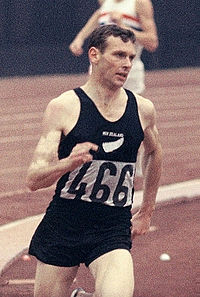Peter Snell
|
Peter Snell |
||||||||||||||||||||||
| Full name | Peter George Snell | |||||||||||||||||||||
| nation |
|
|||||||||||||||||||||
| birthday | December 17, 1938 | |||||||||||||||||||||
| place of birth | Opunake , New Zealand | |||||||||||||||||||||
| size | 179 cm | |||||||||||||||||||||
| Weight | 80 kg | |||||||||||||||||||||
| date of death | December 12, 2019 | |||||||||||||||||||||
| Place of death | Dallas , United States | |||||||||||||||||||||
| Career | ||||||||||||||||||||||
|---|---|---|---|---|---|---|---|---|---|---|---|---|---|---|---|---|---|---|---|---|---|---|
| discipline | Middle distance run | |||||||||||||||||||||
| Best performance | 1: 44.3 min ( 800 m ) 3: 37.6 min ( 1500 m ) |
|||||||||||||||||||||
| Medal table | ||||||||||||||||||||||
|
||||||||||||||||||||||
|
||||||||||||||||||||||
Sir Peter George Snell , KNZM , MBE (born December 17, 1938 in Opunake , New Zealand , † December 12, 2019 in Dallas , Texas , United States ) was a New Zealand athlete .
Snell was a versatile athlete in his youth who was successful in rugby , cricket , tennis (participant in New Zealand's youth championships), badminton and golf . At 19 he concentrated on athletics and just three years later he won the gold medal in the 800-meter run at the 1960 Olympic Games . In 1964 he won both the 800 meters and the 1,500 meter run, which until then only Albert Hill had achieved at the 1920 Olympic Games . In 1962 he ran a world record over a mile and in the 800-meter run within a week . In addition to these successes, he also won the British Empire and Commonwealth Games twice . Due to the periodization of Lydiard he reached twice a year each for a relatively short, stable and predictable time top form and used this skillfully for major victories and records. After his sports career, Peter Snell became a sports physician. Snell's successes are largely due to the training methods of the running coach Arthur Lydiard .
In July 1965, at the age of 26, he surprisingly ended his competitive sports career. Snell had for a tobacco company worked , had been released but mostly for training and competition. In 1971 he moved to the United States, studied human performance (human performance) at the University of California, Davis (BS) and a doctorate (Ph.D.) in exercise physiology ( exercise physiology ) at Washington State University. He was hired by the Texas Southwestern Medical Center in Dallas in 1981 and was soon promoted to associate professor and director of the Human Performance Center .
In 2003 Snell won the American orienteering championships in the 65+ class . Most recently, Snell worked as an exercise physiologist in Texas. His specialty was the treatment of circulatory and heart problems. He often used exercise - particularly jogging - as a method of treatment .
In 2009 he was ennobled. Sir Peter was inducted into the IAAF Hall of Fame in 2012. Snell died in December 2019, a few days before his 81st birthday.
World records and world bests
- 4 × 1 mile (relay), 16: 23.8 min
- 1 mile, 3: 54.4 min
- 1 mile, 3: 54.1 min
- 800 m, 1: 44.3 min
- 880 yards, 1: 45.1 min
- 880 yards (hall), 1: 49.9 min
- 1000 m, 2: 16.6 min
- 1000 yards (hall), 2:06 min
Web links
- Peter Snell in the Sports-Reference database (English; archived from the original )
Individual evidence
- ↑ Olympic legend died at the age of 80. Report on t-online.de , December 13, 2019. Accessed December 14, 2019.
- ↑ James McOnle: Obituary: Sir Peter Snell, the inscrutable genius of middle distance running. In: The Spinoff , December 14, 2019. Accessed December 14, 2019.
- ↑ Arnd Krüger : Many roads lead to Olympia. The changes in training systems for medium and long distance runners (1850–1997). In: N. Gissel (Hrsg.): Sporting performance in change . Czwalina, Hamburg 1998, pp. 41-56.
- ↑ http://www.baoc.org/results/r03/r030914.html
| personal data | |
|---|---|
| SURNAME | Snell, Peter |
| ALTERNATIVE NAMES | Snell, Peter George |
| BRIEF DESCRIPTION | New Zealand athlete |
| DATE OF BIRTH | December 17, 1938 |
| PLACE OF BIRTH | Opunake , New Zealand |
| DATE OF DEATH | December 12, 2019 |
| Place of death | Dallas , Texas , United States |

